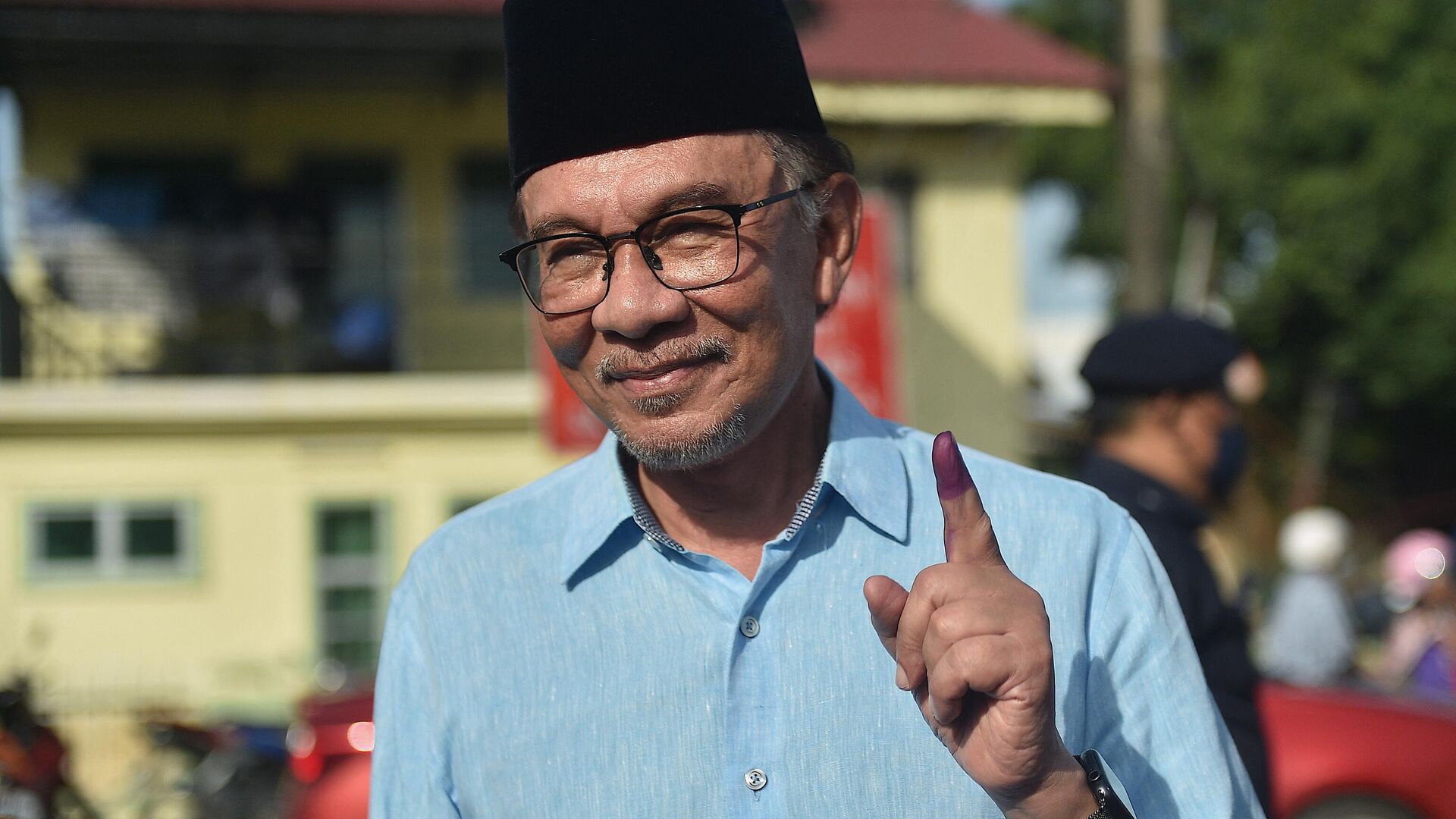https://sputniknews.in/20240820/malaysian-pm-urges-global-south-to-shed-reliance-on-us-dollar-8037287.html
Malaysian PM Urges Global South to End Reliance on US Dollar
Malaysian PM Urges Global South to End Reliance on US Dollar
Sputnik India
Malaysian Prime Minister Anwar Ibrahim has called upon the Global South countries to expand local currency trading settlements to shed reliance on US dollar-dominated financial architecture.
2024-08-20T20:04+0530
2024-08-20T20:04+0530
2024-08-20T20:45+0530
business & economy
malaysia
narendra modi
india
new delhi
ministry of external affairs (mea)
brics
us
dedollarisation
trade in national currencies
https://cdn1.img.sputniknews.in/img/07e8/06/12/7645779_0:159:3077:1890_1920x0_80_0_0_76a6cec2543348f0ba5476f1f5a8ef50.jpg
Malaysian Prime Minister Anwar Ibrahim has called upon the Global South countries to expand local currency trading settlements to shed reliance on US dollar (USD)-dominated financial architecture.Delivering a lecture at government-linked think tank Indian Council of World Affairs (ICWA) at New Delhi's Sapru House, Ibrahim termed the US dollar-dominated international financial architecture as "obsolete".The Malaysian leader noted that pegging local currencies to the US dollar afforded the countries lesser control, adding that dynamics of the USD were being controlled from Washington.He noted that Malaysia was already carrying out around 20% of its trade with China in local currencies, while the corresponding figure for Thailand stood at 18%.Further, Ibrahim remarked that India and Malaysia were also taking steps to expand settlements in the respective currencies, Indian Rupee (INR) and Ringgit.He highlighted that "an empowered Global South", which nations constituted 40% of the global Gross Domestic Product (GDP) and 85% of the world's population, "is inevitable."Ibrahim added that New Delhi, through its successful G20 presidency last year, had demonstrated that it was a key player in "shaping the agenda" of Global South.Likewise, Ibrahim underscored India's prominent role as a BRICS member in supporting Malaysia's application.'BRICS Would Benefit by Including Malaysia'In the meantime, during his address, PM Ibrahim emphasised that Kuala Lumpur's move to formally apply for a BRICS membership was part of its strategic objective to "diversify" its economic diplomacy.He expressed confidence that as a potential BRICS member Malaysia would help in enhancing economic collaboration with other group's states, as well as explore "new avenues" of cooperation.Earlier in the day, India's Ministry of External Affairs (MEA) said that New Delhi would have "no hesitation" in supporting Malaysia's BRICS bid.Meanwhile, Prime Minister Narendra Modi during a joint press briefing at New Delhi's Hyderabad House on Tuesday highlighted the decision of India and Malaysia to elevate their ties to the level of "Comprehensive Strategic Partnership".He stated that both nations firmly believed in the "centrality" of ASEAN in the security architecture of Indo-Pacific, a point emphasised by Ibrahim as well.The discussions between leaders of India and Malaysia resulted in signing eight pacts in the realm of employment and recruitment of workers, traditional medicine, digital technologies, youth affairs, arts, tourism and public administration among others.
https://sputniknews.in/20240619/dedollarisation-economic-diversification-attract-malaysia-to-brics-7654465.html
malaysia
india
new delhi
us
global south
asean
indo-pacific
south asia
southeast asia
Sputnik India
feedback.hindi@sputniknews.com
+74956456601
MIA „Rossiya Segodnya“
2024
Dhairya Maheshwari
https://cdn1.img.sputniknews.in/img/07e6/0c/13/138962_0:0:641:640_100x100_80_0_0_2cb44360dbcdf6d84bf4b299cd045917.jpg
Dhairya Maheshwari
https://cdn1.img.sputniknews.in/img/07e6/0c/13/138962_0:0:641:640_100x100_80_0_0_2cb44360dbcdf6d84bf4b299cd045917.jpg
News
en_IN
Sputnik India
feedback.hindi@sputniknews.com
+74956456601
MIA „Rossiya Segodnya“
Sputnik India
feedback.hindi@sputniknews.com
+74956456601
MIA „Rossiya Segodnya“
Dhairya Maheshwari
https://cdn1.img.sputniknews.in/img/07e6/0c/13/138962_0:0:641:640_100x100_80_0_0_2cb44360dbcdf6d84bf4b299cd045917.jpg
dedollarisation, dedollarisation news, brics expansion, brics currency, dollar hegemony, malaysia brics, malaysia brics membership, global south, voice of global south summit, western sanctions, brics summit, brics news
dedollarisation, dedollarisation news, brics expansion, brics currency, dollar hegemony, malaysia brics, malaysia brics membership, global south, voice of global south summit, western sanctions, brics summit, brics news
Malaysian PM Urges Global South to End Reliance on US Dollar
20:04 20.08.2024 (Updated: 20:45 20.08.2024) Malaysian Prime Minister Anwar Ibrahim made a state visit to India on 19 to 21 August, his first bilateral leadership trip to New Delhi.
Malaysian Prime Minister Anwar Ibrahim has called upon the Global South countries to expand local currency trading settlements to shed reliance on US dollar (USD)-dominated financial architecture.
Delivering a lecture at government-linked think tank Indian Council of World Affairs (ICWA) at New Delhi's Sapru House, Ibrahim termed the
US dollar-dominated international financial architecture as "obsolete".
"Why should we be obsessed with the US dollar?" Ibrahim asked, while responding to a question from an audience member after his address.
The Malaysian leader noted that pegging local currencies to the US dollar afforded the countries lesser control, adding that dynamics of the USD were being controlled from Washington.
Exploring non-USD currencies in trade settlements would minimize the "negative impacts" of being reliant on the dominant system, Ibrahim claimed. At the same time, he admitted that it wasn't possible to do away with global reliance on US Dollar altogether.
He noted that Malaysia was already carrying out around 20% of its trade with China in local currencies, while the corresponding figure for Thailand stood at 18%.
Further, Ibrahim remarked that India and Malaysia were also taking steps to expand settlements in the respective currencies, Indian Rupee (INR) and Ringgit.
The resurgence of Global South represented "reclaiming the voice" which could no longer be ignored by major powers, Ibrahim stressed in his address titled 'Towards a Rising Global South: Leveraging on Malaysia-India Ties'.
He highlighted that "an empowered Global South", which nations constituted 40% of the global Gross Domestic Product (GDP) and 85% of the world's population, "is inevitable."
Ibrahim added that New Delhi, through its successful G20 presidency last year, had demonstrated that it was a key player in "shaping the agenda" of Global South.
He termed India as a "beacon of hope and democracy" in the region, further expressing confidence that New Delhi would
play its "rightful role" in shaping norms.
Likewise, Ibrahim underscored India's prominent role as a BRICS member in supporting Malaysia's application.
'BRICS Would Benefit by Including Malaysia'
In the meantime, during his address, PM Ibrahim emphasised that Kuala Lumpur's move to
formally apply for a BRICS membership was part of its strategic objective to "diversify" its economic diplomacy.
He expressed confidence that as a potential BRICS member Malaysia would help in enhancing economic collaboration with other group's states, as well as explore "new avenues" of cooperation.
Earlier in the day, India's Ministry of External Affairs (MEA) said that New Delhi would have "no hesitation" in supporting Malaysia's BRICS bid.
"Malaysia is keen on joining the BRICS," MEA Secretary (East) Jaideep Mazumdar told journalists in New Delhi after the Indian and Malaysian leadership talks.
Meanwhile, Prime Minister Narendra Modi during a joint press briefing at New Delhi's Hyderabad House on Tuesday highlighted the decision of India and Malaysia to elevate their ties to the level of "Comprehensive Strategic Partnership".
He stated that both nations firmly believed in the "centrality" of ASEAN in the security architecture of Indo-Pacific, a point emphasised by Ibrahim as well.
The discussions between leaders of India and Malaysia resulted in signing eight pacts in the realm of employment and recruitment of workers, traditional medicine, digital technologies, youth affairs, arts, tourism and public administration among others.



